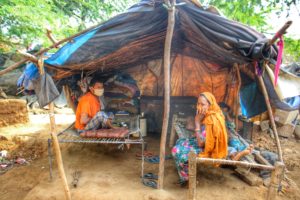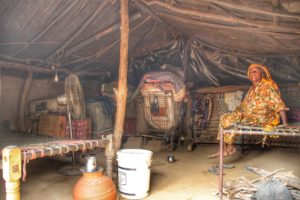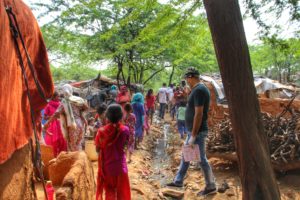The forgotten residents of Delhi’s Bhatti Mines

The degree to which residents of Bhatti Mines are seeped in poverty becomes evident only when you step foot in this forgotten colony housing nearly 50,000 persons, many of them migrants from Pakistan (MIG photos/Varsha Singh)
With nearly 50,000 residents, Bhatti Mines in south Delhi is one of the poorest localities in the capital. Yet, the residents complain that they did not receive any help from the government.
Gurugram or Gurgaon is often referred to the hi-tech city in the National Capital Region of India. Home to thousands of expats and upwardly mobile young tech professionals, the skyline here is dominated by scores of skyscrapers rising 40, 50 or even 60 stories above the ground. Each apartment, costing upwards of INR 10 million, comes inbuilt with all the luxury features that one can seek in a house.
Move barely 25 km east of Gurgaon to reach Bhatti Mines, a former quarry that still bears the deep scars of indiscriminate and unregulated mining that was mercifully stopped nearly 30 years ago when the government declared it to be a wildlife sanctuary. For over 25 years, Bhatti Mines was just a huge complex of quarries that for 25 years (1965–90) yielded red sand, silica and stone for Delhi’s construction industry.
The contrast between Gurgaon and Bhatti Mines could not have been sharper. Here, homes, if they could be called that, are nothing more than very small huts, which in fact are just tents stretched on four wooden poles. None of the huts have any doors or walls and most are just a piece of tarpaulin serving as a roof, with all the sides open. Most of these tents are barely equipped with just a stringed cot, an earthen wood-fired stove, a handful of utensils and if the family has some money then perhaps a fan or a cooler to stave off the singeing heat that grips the entire area from March to October each year.
Bhatti Mines is home to nearly 50,000 persons spread across in 11 villages that have been settled since the 1970s, even though most of the people living here had migrated to India from Pakistan a few years earlier. Many of the residents work as daily wagers, employed by the construction industry.
The residents say that even before the pandemic had struck they had been ignored by the government. ‘‘We don’t even have a ration card or Aadhar card. My mother-in-law had a ration card but that had been cancelled by the government. We have been trying to get it renewed and also get our ration card made but without any success so far,’’ says Kiran, a mother of one child who came to Bhatti Mines about eight years ago after her marriage.

With barest of possessions residents of Bhatti Mines are always only a small nudge away from starvation
Sitting on a cot, inside her hut with a partition made of patches of various rags is Kiran’s mother-in-law who says that the government had never taken care of the people there and hence she was not really surprised that no one, not a single politician or bureaucrat made the trip to Bhatti Mines to see how the residents had been dealing with the pandemic and whether they needed any assistance during the lockdown. Referring to the team of volunteers of Aarohan, a Delhi-based NGO who are distributing food in the area, ‘‘It is only these people who came regularly to visit us, bringing food and checking up on our well-being,’’ she says.
The residents complain that while they were poor before the pandemic, they managed to survive on the money made by them from their temporary, daily wage jobs. ‘‘However, the lockdown led to a complete standstill in our work and we had no money on which to rely over the past three months, putting a big question over our survival. We have managed to survive only because of the charitable organisations giving us a helping hand,’’ she says.

Bhatti Mines has managed to survive the lockdown, only thanks to the regular interventions by Aarohan, a Delhi based NGO
Giving a helping hand to Aarohan’s volunteers are the officials of Civil Defence Force of New Delhi. One of them, Kishore, says that he and five of his colleagues have been posted at Bhatti Mines since the lockdown began and their main job has been to help the residents understand and follow the basic safety and preventive measures such as wearing masks, washing hands frequently as well as keeping social distancing. ‘‘We also help with distribution of food and medical supplies,’’ he says.
Tanish Kumar, who is a member of the civil defence force but also doubles up as a full-time volunteer for Aarohan, says that the government officials have been guilty of neglecting this immense cluster of extreme poverty which lacks even basic civic facilities like a healthcare centre. ‘‘There is a school here and some time back the government wanted to close the school down and move it to another area that was the constituency of the local elected representative. However, the villagers protested and I went to the court on their behalf and finally we have won the case, so the school stays,’’ he adds.
Bhatti Mines is certainly not the only place in the national capital that is riddled with extreme poverty and which has slipped below the radar of the officials incharge of providing assistance and social security to the residents of these areas. The pandemic was an ideal opportunity for the government to show that it cared and officials could have used the lockdown to take care of the long-pending problems in the area, stemming mainly from the government neglect. However, rather unsurprisingly the neglect seemed to have only deepened and the situation of the residents of Bhatti Mines has only worsened and most of them find themselves on the edge.









